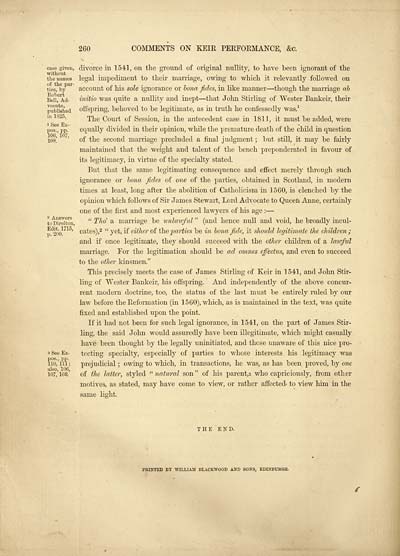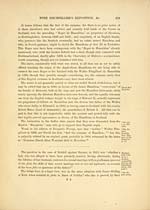Download files
Complete book:
Individual page:
Thumbnail gallery: Grid view | List view

260
COMMENTS ON KEIR PERFORMANCE, &c.
case given,
without
the names
of the par-
ties, by
Kobert
Bell, Ad-
vocate,
published
in 1825.
1 See Ex-
pos., pp.
106, 107,
108.
2 Answers
to Du-eltou,
Edit. 1715,
p. 200.
3 See Ex-
pos., pp.
110, 111 ;
also, 106,
107, 108.
divorce in 1541, ou the ground of original nullity, to have been ignorant of the
legal impediment to their marriage, owing to which it relevantly followed on
account of his sole ignorance or tona fides, in like manner — though the marriage db
initio was quite a nullity and inept — ^that John Stirling of "Wester Bankeir, their
offspring, behoved to be legitimate, as in truth he confessedly was.^
The Coiut of Session, in the antecedent case in 1811, it must be added, were
equally divided in their opinion, while the premature death of the child in question
of the second marriage precluded a final judgment ; but still, it may be fairty
maintained that the weight and talent of the bench preponderated in favour of
its legitimacy, in virtue of the specialty stated.
But that the same legitimating consequence and effect merely through such
ignorance or hona fides of one of the parties, obtained in Scotland, in modern
times at least, long after the abolition of Catholicism in 1560, is clenched by the
opinion which follows of Sir James Stewart, Lord Advocate to Queeii Anne, certainly
one of the first and most experienced lawyers of his age : —
" Thd a marriage be ^mlmcful " (and hence null and void, he broadly incul-
cates),2 " yet, if either of i\\e jiarties be in lonafide, it shoidd legitimate the cliildren ;
and if once legitimate, they should succeed with the other children of a lawful
marriage. For the legitimation should be acl omnes effectus, and even to succeed
to the other kinsmen."
This precisely meets the case of James Stirling of Keir in 1541, and John Stir-
ling of Wester Bankeir, his offspring. And independently of tlie above concur-
rent modern doctrine, too, the status of the last must be entirely rided by our
law before the Reformation (in ] 560), which, as is maintained in the text, was quite
fixed and established upon the point.
If it had not been for such legal ignorance, in 1541, on the part of James Stir-
ling, the said John woidd assuredly have been illegitimate, which might casually
have been thought by the legally uninitiated, and those unaware of this nice pro-
tecting specialty, especially of parties to whose interests his legitimacy was
prejudicial ; owing to which, in transactions, he was, as has been proved, by one
of the latter, styled "natural son" of his parent,3 who capriciously, from other
motives, as stated, may have come to view, or rather affected- to view liim in the
same light.
THE END.
PRINTED BY WILLIAM BLACKWOOD AND SONS, EDINBUKQH.
COMMENTS ON KEIR PERFORMANCE, &c.
case given,
without
the names
of the par-
ties, by
Kobert
Bell, Ad-
vocate,
published
in 1825.
1 See Ex-
pos., pp.
106, 107,
108.
2 Answers
to Du-eltou,
Edit. 1715,
p. 200.
3 See Ex-
pos., pp.
110, 111 ;
also, 106,
107, 108.
divorce in 1541, ou the ground of original nullity, to have been ignorant of the
legal impediment to their marriage, owing to which it relevantly followed on
account of his sole ignorance or tona fides, in like manner — though the marriage db
initio was quite a nullity and inept — ^that John Stirling of "Wester Bankeir, their
offspring, behoved to be legitimate, as in truth he confessedly was.^
The Coiut of Session, in the antecedent case in 1811, it must be added, were
equally divided in their opinion, while the premature death of the child in question
of the second marriage precluded a final judgment ; but still, it may be fairty
maintained that the weight and talent of the bench preponderated in favour of
its legitimacy, in virtue of the specialty stated.
But that the same legitimating consequence and effect merely through such
ignorance or hona fides of one of the parties, obtained in Scotland, in modern
times at least, long after the abolition of Catholicism in 1560, is clenched by the
opinion which follows of Sir James Stewart, Lord Advocate to Queeii Anne, certainly
one of the first and most experienced lawyers of his age : —
" Thd a marriage be ^mlmcful " (and hence null and void, he broadly incul-
cates),2 " yet, if either of i\\e jiarties be in lonafide, it shoidd legitimate the cliildren ;
and if once legitimate, they should succeed with the other children of a lawful
marriage. For the legitimation should be acl omnes effectus, and even to succeed
to the other kinsmen."
This precisely meets the case of James Stirling of Keir in 1541, and John Stir-
ling of Wester Bankeir, his offspring. And independently of tlie above concur-
rent modern doctrine, too, the status of the last must be entirely rided by our
law before the Reformation (in ] 560), which, as is maintained in the text, was quite
fixed and established upon the point.
If it had not been for such legal ignorance, in 1541, on the part of James Stir-
ling, the said John woidd assuredly have been illegitimate, which might casually
have been thought by the legally uninitiated, and those unaware of this nice pro-
tecting specialty, especially of parties to whose interests his legitimacy was
prejudicial ; owing to which, in transactions, he was, as has been proved, by one
of the latter, styled "natural son" of his parent,3 who capriciously, from other
motives, as stated, may have come to view, or rather affected- to view liim in the
same light.
THE END.
PRINTED BY WILLIAM BLACKWOOD AND SONS, EDINBUKQH.
Set display mode to:
![]() Universal Viewer |
Universal Viewer | ![]() Mirador |
Large image | Transcription
Mirador |
Large image | Transcription
Images and transcriptions on this page, including medium image downloads, may be used under the Creative Commons Attribution 4.0 International Licence unless otherwise stated. ![]()
| Permanent URL | https://digital.nls.uk/95373911 |
|---|
| Description | A selection of almost 400 printed items relating to the history of Scottish families, mostly dating from the 19th and early 20th centuries. Includes memoirs, genealogies and clan histories, with a few produced by emigrant families. The earliest family history goes back to AD 916. |
|---|

![[Page 261]Some remaining addenda and corrigenda](https://deriv.nls.uk/dcn4/9537/95373925.4.jpg)